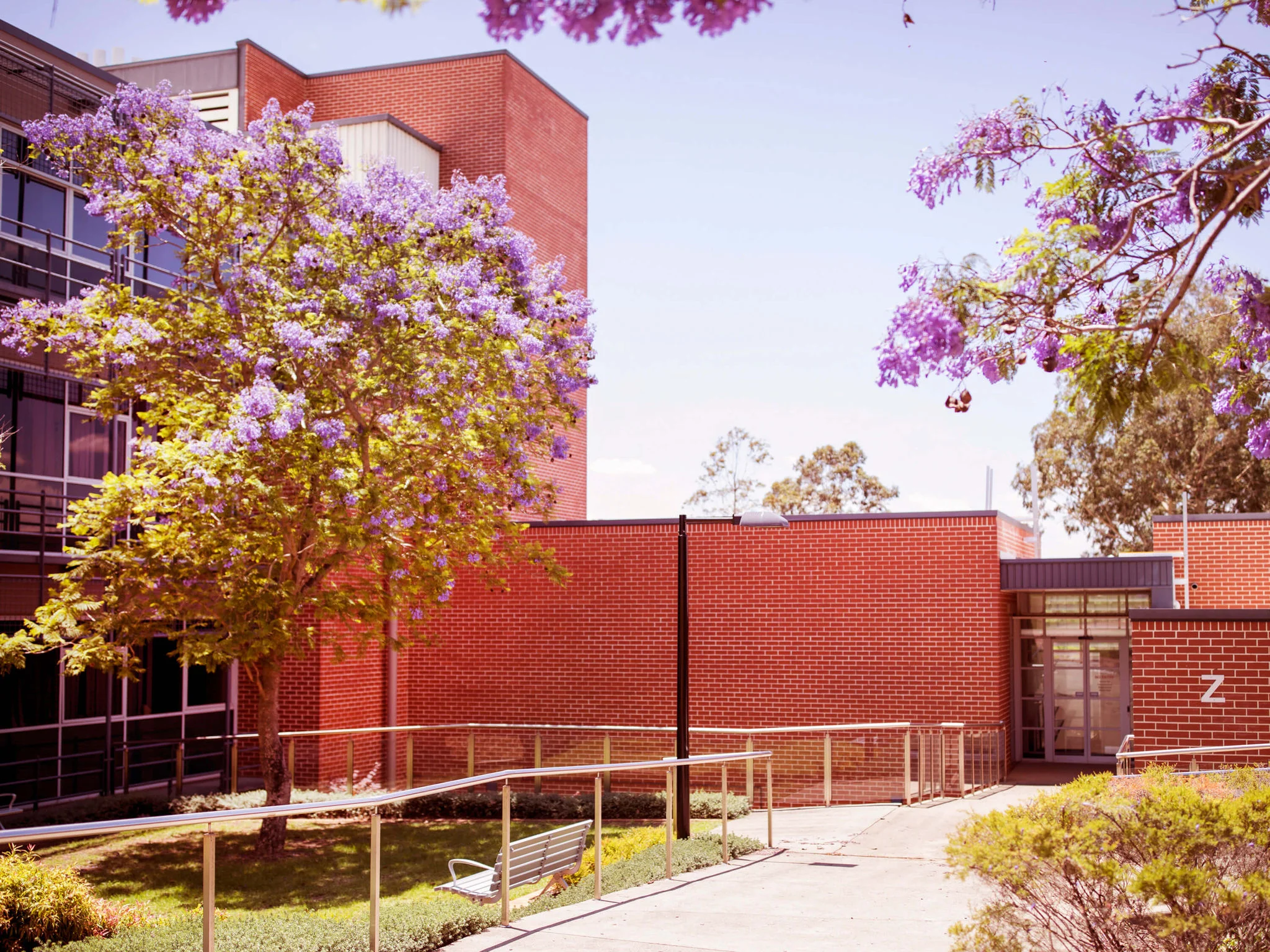This program gives you the knowledge you need to become an in-demand computing professional. You will gain skills in a practice-based learning environment, be introduced to real-world project experience, and acquire a solid knowledge of ICT theory.
Invent your career in bits and bytes
The School of Computer, Data and Mathematical Sciences (CDMS) is a certified CISCO and AWS Education Partner. Specialised CDMS programs prepare students for industry-recognised credentials by embedding CISCO and AWS certification content, with students also gaining access to the CISCO Networking Academy and AWS Academy.
Accredited with the Australian Computer Society (ACS) at the Professional Level.
Through the partnership with AWS Academy, teaching delivered at The Smart and Distributed Computing (SDC) Lab integrates the AWS curriculum into cloud computing subjects. Students build strong fundamentals while gaining practical skills with AWS technologies, preparing them for industry-recognised AWS certifications.
The SDC Lab offers both teaching and research projects in diverse cloud computing projects. From being actively engaged with AWS DeepRacer to apply theory of machine learning and autonomous systems, to research projects supported by organisations such as the Australian Research Council (ARC), Australian Research Data Commons (ARDC), and AWS, that tackle real-world challenges in healthcare, agriculture, and smart cities.
The Optimize program is an annual student showcase that highlights innovative student and researcher projects in computing, data science, robotics, and related fields. Students are encouraged to submit their projects or research and in turn, gain valuable experience in digital communication skills while connecting with academics and industry professionals. Visit Optimize to see award-winning student projects over the years.
Students also have the opportunity to join clubs such as the Robotics Club or Creators Club, an extracurricular activity with industry collaboration.
As an Adobe Creative Campus, Western Sydney University gives all students complimentary access to the Adobe Creative Cloud, so you can level up your digital skills with FREE access to the Adobe Creative Cloud apps. It's like your very own innovation toolkit, where technology meets creativity!
Adobe Creative Cloud is a comprehensive suite of software tools and services which provide a one-stop platform for professionals and enthusiasts in various creative fields, offering a wide range of applications for graphic design, video editing, web development, photography, and more!
What you can expect to study
The program structure is outlined in our handbook. Here you can view all of the subjects you will be studying.
You can choose from the following majors:
The Cyber Security major aims to develop graduates with sound skills in the discipline of information systems security. Today, the widespread use of networked systems means protecting these systems from various attacks is more important than ever. Cyber Security is an essential aspect of today’s information systems.
This major covers fundamental information security knowledge and security protocols from basic cryptography algorithms to their applications in computer systems and networked systems. Students will learn fundamental security concepts, practical implementation of the security application programs as well as ethical hacking techniques to protect cyber security.
This major is for highly motivated students who wish to enhance their experience and further their career opportunities through work-integrated learning. Most subjects in the major offer placements with industry partners, including a six-month internship. The internships are offered by our industry partners, such as DXC, which is the main supplier of the technology for the Aerotropolis infrastructure. There is a limited number of internships available each year; hence students will need to perform at an advanced level to secure one of these. Undertaking the internship will strongly increase the landing of a permanent position with target industry partners upon graduation. The major covers theories and technologies used for the development of large-scale infrastructure projects and the systems and integration that go along with projects of this size. Students will better understand the development and management processes related to each phase of the project and development life cycle. In addition, they will identify, analyse, and formulate solutions to real-world problems that occur in large-scale infrastructure projects. In devising these solutions students will consider principles associated with user interface design, professional and ethical issues, in particular, those relating to security and privacy of customer data and customer behaviour. Students who fail to secure an internship will be transferred to the Software Development major to be able to complete their ICT studies.
This major will deal with a comprehensive focus on the technical and theoretical knowledge of design, development and deployment of software applications in the field of Entertainment Computing.
Increasingly, healthcare information is being captured electronically and newer technology modes are being applied in many innovative ways to support efficient and effective clinical care. This major aims to promote understanding of Information and Communications Technology (ICT) concepts in healthcare including electronic healthcare records; healthcare data analysis; fundamentals of medicine concepts and disease classification; healthcare system interoperability and design. This specialisation will prepare students for the ICT challenges ahead in the healthcare domain, and equip students with the knowledge and skills for taking up employment opportunities with major public and private healthcare providers and technology suppliers.
This major covers topics in the traditional areas of calculus and algebra. Single and multivariable calculus are covered, as well as topics in linear algebra, analysis and mathematical modelling. This major is available to all undergraduate students and may meet the NSW Institute of Teachers accreditation requirements for teaching Mathematics as a first subject in NSW state high schools.
This major covers theories and technologies used for the development of distributed applications for hand-held mobile devices. Students completing this major will understand the advanced principles related to mobile hardware devices, data storage and transmission, and communication networks. In addition they will identify, analyse, and formulate solutions to real-world problems in the mobile domain. In devising these solutions students will also consider principles associated with user interface design, professional and ethical issues, in particular those relating to security and privacy of user data and user behaviour related to mobile devices and its applications.
The Networking Major provides the students with in-depth knowledge for the analysis, design, and implementation of networked systems. It offers the students the opportunity to develop the technical skills needed for management and secure operation of a broad range of systems, including LANs, WANs, wireless networks, distributed systems, and large heterogeneous networks.
Career Opportunities
As a graduate of this degree, you can look forward to a broad range of exciting career opportunities in different sectors and industries. Below are some examples of the possible careers you can pursue with this degree:
- Network administrator or engineer
- Systems architect
- Web analyst
- Software quality analyst
- Software engineer analyst
- Games developer
- Information systems manager
Entry requirements for domestic students
Applicants who have undertaken studies overseas may have to provide proof of proficiency in English. Local applicants who are applying through the Universities Admissions Centre (UAC) will find details of minimum English proficiency requirements and acceptable proof on the UAC website. Local applicants applying directly to the University should also use the information provided on the UAC website. Find out more here.
Admission
- Assumed knowledge required: HSC Mathematics and any two units of HSC English
Please consult the handbook for more information.
Entry requirements for international students
**Please note, if this course lists a part-time option, this is not available to International Students on a Student Visa.
Please consult the handbook for more information regarding entry requirements for this course.
You can read more about international academic entry requirements here.
Indicative annual fee
A Commonwealth Supported Place (CSP) is one that is subsidised by the Commonwealth and applicable only to Domestic students. This means that the Australian Government pays part of your fees towards your program, therefore reducing your program fees, and the remaining amount is paid by you, this is considered your Student Contribution.
The fee estimates provided are indicative only and subject to change. These estimates are based on the current fee structures for a normal full time study load. However, the final fees may vary depending on several factors, including the specific subjects chosen, the duration and timing of study, and annual fee adjustments (subject to Commonwealth student contribution band rates). Please note that these estimates do not include the Student Services and Amenities Fee. We encourage all prospective and current students to consult with our Student Services Hub for the most current fee information.
As a multi-campus institution, Western Sydney University and its entities reserves the right to alter the location of its programs between campuses and other locations as necessary.
To work out how much your Student Contribution will be before you study, you will first need to find out the Student Contribution band your subjects fit into based on their general discipline area.
You can then calculate your student contributions to work out the total amount of your contribution.
The Higher Education Loan Program (HELP) is a range of loans introduced by the Australian Government from 2005 to provide fee payment assistance to eligible students. Loans are for Australian citizens studying in Australia or overseas. Permanent residents who hold a humanitarian visa are also eligible if studying in Australia.
If eligible you may be able to defer all or part of your Student Contribution through the HECS-HELP loan program. You may also be eligible for OS-HELP if undertaking studies overseas.
New Zealand citizens and holders of an Australian permanent resident visa (other than an Australian permanent humanitarian visa) are generally not entitled to HECS-HELP assistance. If you are a New Zealand citizen or permanent resident your Student Contribution amount must be paid in full by the census date.
However, the Australian Government has passed new legislation that changes the way some New Zealand citizens, who hold a Special Category Visa (SCV), studying in Australia will pay their fees. More information is available on the Changes to fees for New Zealand Citizens webpage.
Apply as a Domestic Student
If you are a domestic student, you can apply through our Western Application system which is free of charge.
Domestic students are:
- Australian Citizens
- New Zealand Citizens
- Australian permanent residents
- Australian permanent humanitarian visa holders
Scholarships
Western Sydney University recognises and rewards students who demonstrate community engagement, outstanding academic ability and superior leadership skills. Donor-funded scholarships are also available, providing support for students based on both academic achievements and equity considerations. There are also scholarships available for specific degrees.
The fee estimates provided are indicative only and subject to change. These estimates are based on the current fee structures for a normal full time study load. However, the final fees may vary depending on several factors, including the specific subjects chosen, the duration and timing of study, and annual fee adjustments (subject to Commonwealth student contribution band rates). Please note that these estimates do not include the Student Services and Amenities Fee. We encourage all prospective and current students to consult with our Student Services Hub for the most current fee information.
As a multi-campus institution, Western Sydney University and its entities reserves the right to alter the location of its programs between campuses and other locations as necessary.
Apply as an International Student
If you are an international student, you can apply for free through our international student application system or through an agent representative.
International students are:
- Not an Australian citizen;
- Not a New Zealand citizen; and
- Not a permanent resident of Australia.
If you are an international student completing the Australian HSC, IB or NCEA, apply direct via UAC International.
Admission to Western Sydney University is on the basis of meeting minimum academic and English language requirements. For more information about tuition fees and other costs, visit the Fees and Costs page.
Scholarships
When you apply to Western, you’re automatically assessed for a Scholarship, no additional application required! We’re offering multi-year scholarships (for up to 3 years) valued at $6,000 or $3,000 and even 50% off tuition fees. Scholarships are awarded on academic merit.
Want to know more?
We're here to provide clarity.
If you're uncertain about your study journey, enquire about our program today and gain the confidence to move forward.
Australian students
1300 668 370
International students
+61 2 9852 5499

The fee estimates provided are indicative only and subject to change. These estimates are based on the current fee structures for a normal full time study load. However, the final fees may vary depending on several factors, including the specific subjects chosen, the duration and timing of study, and annual fee adjustments (subject to Commonwealth student contribution band rates). Please note that these estimates do not include the Student Services and Amenities Fee. We encourage all prospective and current students to consult with our Student Services Hub for the most current fee information.
As a multi-campus institution, Western Sydney University and its entities reserves the right to alter the location of its programs between campuses and other locations as necessary.






